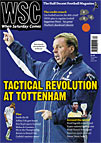 Roger Titford ponders what football can learn from previous financial downturns and what fans can expect in the current credit crunch
Roger Titford ponders what football can learn from previous financial downturns and what fans can expect in the current credit crunch
English football has become much more efficient at gathering its harvest early and therefore should be cushioned from some of the most immediate effects of the credit crunch. TV deals are wrapped up for years to come – the ITV Digital fiasco notwithstanding – sponsorships are in place and season tickets sold. Things can go wrong in the world of high finance, though, as West Ham have found, having an Icelandic owner and losing a shirt sponsor.